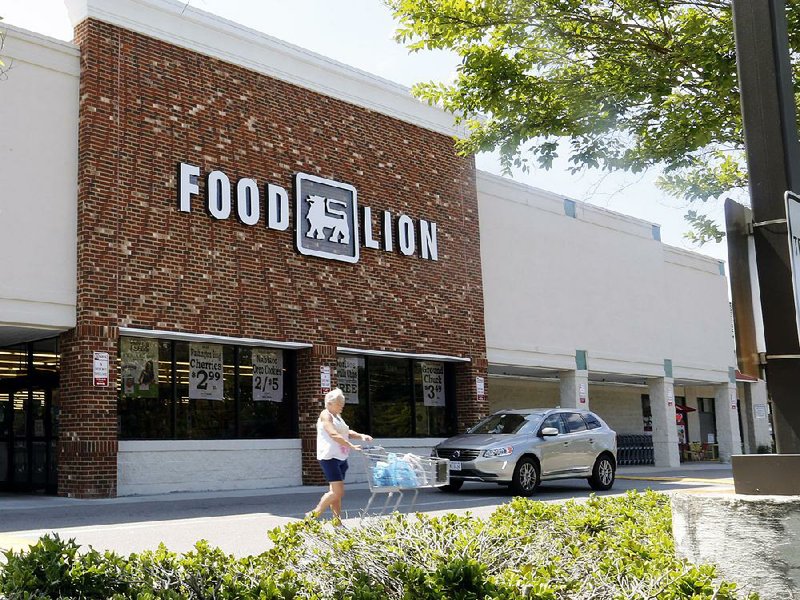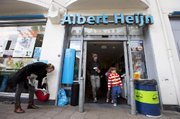The merger agreement between the Dutch supermarket operator Ahold and the Delhaize Group of Belgium last week reflected yet another sign of the malaise hanging over the grocery business in the United States.
While the deal would, if approved, create one of the largest supermarket operators in the United States, marrying Delhaize's Food Lion and Hannaford chains to Stop & Shop and Giant stores owned by Ahold, the move followed a string of grocery-store mergers and a burst of new competitors across the United States.
With the companies generating more than half of their sales in the United States, their merger is expected to help them compete better with Safeway and Albertson's, which recently merged, and with Wal-Mart Stores Inc., which has the largest grocery business in the country.
The grocery business historically is one of razor-thin profit margins, and in the past decade, mainstream grocers have faced greater competition from warehouse stores that sell in bulk like Costco and retailers like Wal-Mart and Target that have melded grocery operations with a broader product mix.
Then, too, dollar stores, convenience stores, private-label-based discounters like Aldi and Trader Joe's, and even higher-priced "natural" foods stores like Whole Foods and Sprouts, have cut into traditional grocery sales.
Thus, over the past three years, Spartan Stores has merged with Nash Finch and Safeway with Albertson's, while Kroger has bought Harris Teeter.
"All this activity is a product of what is just a very flat business in terms of sales growth," said Kurt Jetta, chief executive of the consumer analytics firm TABS. "If you can't grow the top line, you need to find synergies and efficiencies that will help the bottom line."
According to Progressive Grocer, supermarket sales rose to $638.3 billion in 2014, from $620.2 billion the year before, an increase of 2.9 percent in a year when the U.S. Department of Agriculture put inflation in food prices at 2.4 percent.
Some privately held regional chains, like Wegmans and H-E-B, however, are holding their own.
Under the latest deal, the combined company would be called Ahold Delhaize and would be worth about $29.5 billion, based on market capitalization. It would have more than 6,500 stores and 375,000 employees in the United States and Europe, and sales of $60.5 billion.
Ahold and Delhaize said they expected $559.2 million in annual cost savings by the third year after the transaction, after taking one-time charges of about $392.1 million. The two companies' stores have little overlap, but they will be able to save money through shared advertising and promotions and consolidating distribution and warehousing.
Such cost savings, rather than consolidation, are driving mergers in the industry, said Meredith Adler, an investment analyst at Barclays, noting that, at the same time, new grocery chains are appearing. Wal-Mart has been introducing smaller, grocery-only stores called Neighborhood Market, and Whole Foods recently announced plans to open a chain of stores to appeal to more budget-conscious consumers.
"There have been some transactions, yes, but they seem to be really logical for the most part," Adler said. "These companies seem to have thought hard about how the companies fit strategically and what they can achieve in terms of efficiencies and synergies."
Such synergies will not extend to putting a single name, or banner, on all of the stores, an Ahold spokesman said.
And Adler said, "There is lots of evidence that to really do it right, you want to keep the individual identities conveyed by the different banners since there's often great loyalty to the banners among customers." She added, "The challenge is then to get the benefits of scale and efficiency that come with being one company without harming those individual identities."
In the first quarter, pricing pressure cut into Ahold's margins in the United States, with net sales dropping about 2 percent, to $7.84 billion, and Food Lion, which once sprawled to Texas and Florida, has struggled. "If you look at their market share, it's still very low, other than in North Carolina, where its heritage is," Jetta said.
He said Food Lion's attempt to institute an "everyday low pricing" strategy to compete with Wal-Mart had fallen flat, as it kept the chain from using promotions to attract customers.
A bright spot among the two companies' businesses is Ahold's grocery-delivery service, Peapod, which is one of the largest. But those types of businesses, which include FreshDirect and Amazon Fresh, account for just a tiny sliver of the overall grocery market.
The merger is subject to shareholder and regulatory approval and is expected to close in mid-2016. The boards of each company have unanimously recommended that shareholders support the deal.
If the merger is completed, Mats Jansson, the Delhaize chairman, would be chairman of Ahold Delhaize, and Dick Boer, the Ahold chief, would continue in that role at the combined company.
Jan Hommen, the Ahold chairman, and Jacques de Vaucleroy, a Delhaize director, would be vice chairmen. Frans Muller, the Delhaize chief executive, would be deputy chief executive and chief integration officer.
The merged company would be based in the Netherlands, with its European head office in Brussels.
In a research note on June 24, Bruno Monteyne, an analyst at Sanford C. Bernstein, said the potential cost savings were "sensible" but expressed concerns about the potential execution risk because similar large-scale mergers in the food sector have not succeeded. The Albertson's-Safeway merger, in particular, has been difficult, analysts said.
SundayMonday Business on 06/28/2015

